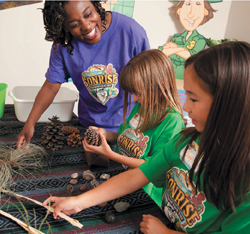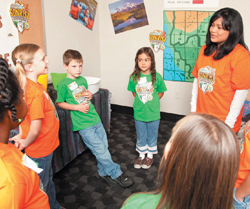Practical help for pastors and lay leaders in selecting the best outreach program
Vacation Bible School (VBS) has come a long way since 1923 when Standard Publishing produced the first printed faith-based curriculum for children, which was designed as a five-week course. Today, VBS has morphed and expanded into the largest church outreach program of the year for kids, though it only lasts a few days of their summer.
Churches nationwide gear up during the winter and spring months for the summer event by investing precious time, money and resources for a number of reasons. The most obvious one is the opportunity to reach out to the local community with the love of Christ and the message of hope. VBS is a non-threatening way for families to walk onto a church campus and experience firsthand a church’s commitment to loving and ministering to people.
VBS also creates a great opportunity for the entire congregation to support and highlight its children’s ministry. VBS should always be a big deal. The exposure it creates for children’s ministry is invaluable.
But choosing the right program for your church and community can be difficult. There are a lot of great options available. When choosing a VBS, consider the following checklist:
Goals. Decide what your goal is for hosting a VBS. If you want to draw kids and families from the community to your church, then you need something that is designed to be highly outreach-oriented. If your goal is to have a week of fun and learning for your church kids, then look for a VBS that will provide fun with a solid foundation of teaching. Almost all the VBS curricula on the market provide a list of main points and the Bible focus for the week. Doing some homework in this area will pay off.
For example, Gospel Publishing House’s Mega Sports Camp (MSC) is a VBS model that does an exceptional job in the area of outreach. Kids and churches are drawn to it because it’s a sports camp instead of a traditional VBS program. Men are also more likely to get involved because unlike traditional VBS curricula, MSC is all about teaching youngsters the fundamentals of sports.
Almost every VBS on the market has a different structure. Most of them, however, are designed to last five days—usually between three and four hours each day. They sometimes also have options for dividing the curriculum into more days and shorter time frames. A good VBS will offer you ideas and encouragement to follow a designated path or formula, but remain very flexible.
MSC is also a great example of flexibility. It is designed to be a five-day, three-hour a day event. But churches use it as a 10-week summer alternative to their Wednesday or Sunday evening
ministry times.
 There are also many different types of VBS curricula on the market—traditional classroom, large group/small group and rotation models, and just about everything in between. A good
There are also many different types of VBS curricula on the market—traditional classroom, large group/small group and rotation models, and just about everything in between. A good
example of the rotation model is Sky VBS by Group
Publishing, in which kids rotate through seven
stations with their “flight crew.” The important thing to remember is to look for what best fits your needs and the goals you want to accomplish.
Doctrine. VBS programs are usually not heavy on doctrine. But you must always be careful that nothing you are teaching conflicts with your church’s beliefs. A quick overview of the director’s guide in the curriculum will usually help you determine what is going to be taught and how.
Cost. A budget is an absolute must. A VBS kit will usually cost anywhere from $99-$200, and they almost always require a few more “necessary” pieces. The final cost for a VBS could range anywhere from $300-$3,000. Many times, a majority of the costs are wrapped up in the “extras” that must be purchased. The number of kids you are planning for will also be a determining factor in the cost.
Draft a budget for the curricula you are considering. It’s wise to spend some time digging into the curriculum to see how many extra necessary items you need to purchase in addition to the kit. Also, consider the amount you will need to spend on promotion, snacks, decorations, craft supplies and games, among other things.
Remember, though, that churches can almost always find creative ways to cut costs. Consider borrowing decorations from other churches, schools or community groups. Look for businesses that would be willing to donate craft supplies or snacks in exchange for ad placement on your promotional material. Remember also to make a list of all your VBS needs to give church members the opportunity to donate.
Teacher Friendliness. Is it easy to use? Can it be easily followed? Is it logical? Does it include everything required for a successful event? The easier a curriculum is to use and follow, the easier it will be for you to find the extra help you will need to put on the event.
Remember also that VBS can be a way for your church to get a brand new group of volunteers. They will often build relationships and stick around because they had such a great time serving during VBS.
The best way to find extra people is to look for those who don’t normally serve in your children’s areas. School teachers who are too busy or too tired to serve in the children’s ministry on a regular basis will almost always be willing to give a week or two during the summer for VBS or camp. If you are doing a sports camp, find the guys in your church who are athletes and encourage them to come and make a difference. Teenagers can also be a valuable asset if they are supervised and given proper instruction.
Kid Friendliness. Kids want to have fun. Remember that this is their summer break, not summer school. Youngsters want to be entertained, do something different than school and connect with other kids. They want to make friends and memories.
MSC, PandaMania by Group Publishing and Adventures on Promise Island by Standard Publishing are all great examples of VBS curricula that are about kids having fun.
Not Fads. Fad curricula are like any other kind of fad. They are not all bad, but just because everyone else is doing it, doesn’t make it a good fit for your church. If you do find yourself in a situation where there are two or three other churches around town doing the same VBS as you, there are several things to remember: What can we do differently? How do we stand out? What can we share that will cut costs for all of us?
Make sure you don’t fall into the fad trap. Go back to your goals and make sure the curriculum you are choosing fits the needs of your church.
Prayer. Above all else, make this choice a matter of prayer. Think about, pray about it and then buy what will best meet the needs of the children, families and community that you serve.
Scott Berkey is the national director of the Children’s Ministries Agency for the Assemblies of God. Patti Chapman is a resource specialist of the agency for the Pentecostal denomination.
VBS Smart Shopping TIPS
by Donna Lucas
Most VBS publishers will allow you to review a sample kit. Read through the materials. Imagine how the theme decorating will work at your church and listen to the music.
To help you evaluate, here are several basic questions to ask.
1. Are these lessons biblically based? Do they teach and honor the Word of God? Read the doctrinal statement of the publisher.
2. Does the curriculum present the gospel message in a clear, concise way that is kid-friendly and usable for the average volunteer?
3. Will the theme engage youngsters’ imaginations and appeal to them? Does the theme carry through more than one area? In what way does the theme reinforce the Bible content and message?
4. Are the learning objectives and life applications relevant to the lives of the kids you will have at VBS?
5. Is the material organized, clear and easy to follow? Is it user-friendly? Are there options for teachers to choose from?
VBS is too important a purchase, too long-lasting in its impact and too far-reaching in its scope to think it’s something we can choose on the basis of a gut reaction or popularity vote. Pray, consider, know your reasons and shop strategically.
Donna Lucas is Gospel Light’s children’s publishing director.
Get Spirit-filled content delivered right to your inbox! Click here to subscribe to our newsletter.
Dr. Mark Rutland's
National Institute of Christian Leadership (NICL)
The NICL is one of the top leadership training programs in the U.S. taught by Dr. Mark Rutland. If you're the type of leader that likes to have total control over every aspect of your ministry and your future success, the NICL is right for you!
FREE NICL MINI-COURSE - Enroll for 3-hours of training from Dr. Rutland's full leadership course. Experience the NICL and decide if this training is right for you and your team.
Do you feel stuck? Do you feel like you’re not growing? Do you need help from an expert in leadership? There is no other leadership training like the NICL. Gain the leadership skills and confidence you need to lead your church, business or ministry. Get ready to accomplish all of your God-given dreams. CLICK HERE for NICL training dates and details.The NICL Online is an option for any leader with time or schedule constraints. It's also for leaders who want to expedite their training to receive advanced standing for Master Level credit hours. Work through Dr. Rutland's full training from the comfort of your home or ministry at your pace. Learn more about NICL Online. Learn more about NICL Online.


